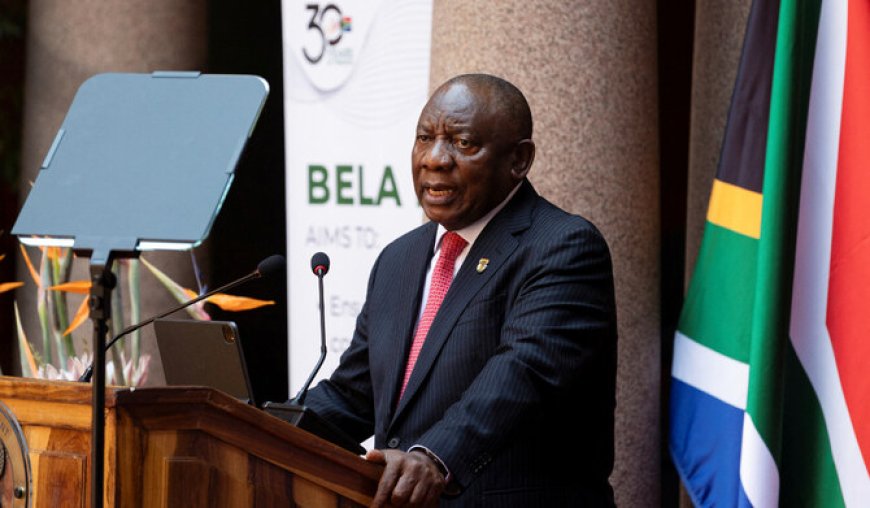Opinion: South Africa's Genocide Case Against Israel at the International Court of Justice: A Critical Step or a Diplomatic Gamble?
South Africa’s determination to pursue a genocide case against Israel at the International Court of Justice (ICJ) has drawn significant international attention. As President Cyril Ramaphosa confirmed, his government is preparing to file extensive evidence next month to substantiate its claims that Israel’s military actions in Gaza violate the 1948 UN Genocide Convention. This move, while bold, carries significant political and legal implications for both South Africa and the broader global community.

South Africa’s determination to pursue a genocide case against Israel at the International Court of Justice (ICJ) has drawn significant international attention. As President Cyril Ramaphosa confirmed, his government is preparing to file extensive evidence next month to substantiate its claims that Israel’s military actions in Gaza violate the 1948 UN Genocide Convention. This move, while bold, carries significant political and legal implications for both South Africa and the broader global community.
At the heart of this case is the accusation that Israel’s military operations in Gaza, initiated in response to Hamas’ deadly October 7, 2024, attack, amount to acts of genocide. Israel has categorically denied these allegations, describing its military operations as a legitimate response to terrorism, aimed at neutralizing Hamas. This legal battle, which now involves other countries such as Colombia, Libya, Mexico, Spain, and Turkiye, raises the question: Is this case an overdue push for justice, or does it risk inflaming an already volatile situation?
The Legal and Political Context
South Africa’s filing in December 2024 marks one of the most significant legal challenges to Israel’s conduct in Gaza. The ICJ, established to resolve disputes between states, is a respected judicial body, but accusations of genocide carry an extraordinarily high burden of proof. Under the Genocide Convention, genocide is defined as acts committed with intent to destroy, in whole or in part, a national, ethnical, racial, or religious group. While the human toll in Gaza is undeniable, with over 41,000 Palestinians killed according to Gaza’s health ministry, proving that Israel’s actions meet this threshold will be a daunting challenge.
Moreover, South Africa’s decision to file the case reflects its broader stance on Palestinian self-determination and its critique of Israeli policies. The country's history of apartheid gives it a unique moral standing when addressing issues of oppression and human rights violations. However, the complexity of the Israeli-Palestinian conflict means that its intervention is seen by some as oversimplifying a deeply rooted and multifaceted issue.
Is Genocide the Right Charge?
Critics of South Africa’s case argue that charging Israel with genocide may not only be legally challenging but could also hinder diplomatic efforts for a ceasefire or peace talks. Genocide, as defined in international law, involves the intent to eliminate a specific group. Israel has consistently argued that its military operations target Hamas, a militant organization, rather than the Palestinian people as a whole.
On the other hand, advocates for the case, including several countries that have joined South Africa, point to the disproportionately high civilian death toll in Gaza. Israel’s blockade of Gaza, the destruction of infrastructure, and the large-scale displacement of civilians have all been cited as evidence of systemic violence that goes beyond mere military operations. To these countries, the sheer scale of suffering in Gaza justifies international legal intervention at the highest level.
The Implications for International Law
If the ICJ agrees to hear the case, it could set a significant precedent in international law. The Court could potentially explore whether states, even those defending themselves from attacks, bear a legal responsibility to avoid excessive harm to civilians. This might introduce new standards for military conduct and accountability in conflict zones.
However, pursuing such a case could also backfire diplomatically. Israel enjoys strong support from many Western countries, including the United States, which has historically used its veto power at the United Nations Security Council to block resolutions critical of Israel. If the ICJ rules in favor of South Africa’s case, it could escalate tensions between Israel and its critics, hardening divisions and making future peace negotiations more difficult.
A Call for Ceasefire and Hostage Return
Alongside the legal case, South Africa and its partners continue to push for an immediate ceasefire and the return of hostages held by Hamas. While these demands are shared by many in the international community, the ongoing violence complicates such efforts. Israel, citing its right to self-defense, has shown little willingness to halt its operations until Hamas is significantly weakened, while Hamas continues to demand the end of what it sees as Israeli occupation.
For South Africa, this legal case is not just about holding Israel accountable—it’s also a broader plea for international action to end the violence and suffering in Gaza. Yet, as the filing moves forward, the international community must consider whether legal channels can effectively address such a protracted and deeply entrenched conflict.













































